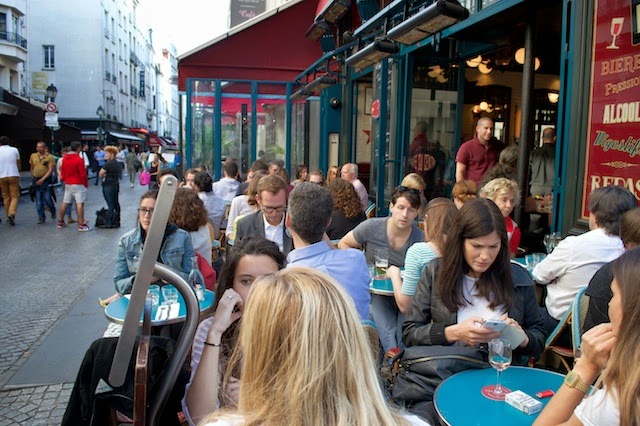Our final stop befoe returning to Paris is Lyon, second largest city in France. Before I tell you about Lyon, I have a bit of an itinerary update for you. We told a few that we would be taking a train from Lyon to Paris, to avoid the thrill of driving in Paris itself. If you've been following the news from France, you may be aware that there is a train strike. We decided that the risk of having our arrival in Paris delayed was too great, so we cancelled our train reservations and will be driving back tomorrow. Wish us luck.
Now for Lyon.
The area where we have our apartment is in the St. Jean neighorhood, which draws its name from this cathedral a couple of blocks away. The city planners have preserved the parvis in front so there is a nice unobstructed view of the façade.
But the dominant structure is the new Palace of Justice on the edge of the river. With its name and its twenty-four-columned front, it lends its name to many of the businesses in the area, including where we had our first meal here.
Last night we had dinner at Aux 24 Colonnes, a nearby bistro recommended by our apartment host. We had a lovely meal, and I was able to establish myself as an internationally known sit-down comic.
What follows may pique the curiosity of the French-speakers among you. If so, or if you want full details on the jokes involved, see the section entitled "Spoiler Alert" below.
On the left of the door as we entered was this:
I read it, translated it into English, and it was not funny. I know humor doesn't translate well, so I asked Eric, the owner, for an explanation, which made the joke a very funny play on words, pun, or groaner, depending on your own tag for such humor. While sitting at our table, I told him I had such a joke of my own, and he stepped back, folded his arms, and dared me. I recited the joke in French, and was delighted at his reaction. "I like it. I like it a lot. I'll put it on the board. <pause for thought> Tomorrow." I said "Tomorrow? May I come back and get a picture of it with you?" Of course, he was delighted, so here is my joke, posted as the "Phrase du Jour" at Aux 24 Colonnes in Lyon, France.
And to prove it's mine, a picture of Eric and me.
Our apartment has windows onto a little courtyard with a view of the Basilica of Notre Dame atop the nearby hill.
It's easily reached by a funicular, so we just had to check it out. It's recent, as basilicas in France, go, having been built as a result of the city's being spared in the Franco-Prussian war of 1870.
The inside is spectacular. I haven't seen the numbers on the mosaic tiles used in the artwork, but the detail is stunning. This is one of the vaults over the nave. This basilica was one of those places where we could have just sat in awe for hours.
Tomorrow we head out for Paris. Google thinks it's a four-hour drive, but I don't think Google knows there's a train strike and we're probably not the only ones renting a car to get there. So we'll just see about that.
Spoiler Alert
Here's the first joke, first in French, then English, then the explanation.
"Bonjour" dit l'homme à l'âne. "Bonjour" dit l'âne à l'homme. "Comment t'appeles tu?" dit l'homme à l'âne. "Bob"dit l'âne.
"Hello" said the man to the donkey. "Hello" said the donkey to the man. "What is your name?" said the man to the donkey. "Bob" said the donkey.
Explanation: In French, the last sentence sounds like the name of the famous American folk singer "Bob Dylan".
My joke, the only French joke I knew before now, found on a website for learning French, and slightly adapted by Eric because he used a homophone for one of the words, but the idea is still the same.
Quelles differences y-at-il entre: un marteau? une poule? une semaine?
Le marteau a un manche, la poule a 2 et la semaine a dix manches!!!
What are the differences between a hammer, a chicken, and a week?
The hammer has one handle, the chicken has two legs, and the week has ten 'manches'!!!
Explanation: The word
manche in French has two meanings when used by itself. One is "handle", so a hammer has only one. The second is "leg" in certain contexts, so to say that a chicken has two makes sense. The joke comes on the last word. In French, the word for Sunday is
dimanche, which sounds like "ten manches". I told you humor doesn't translate well, but it's funny in French.


.jpg)
















































